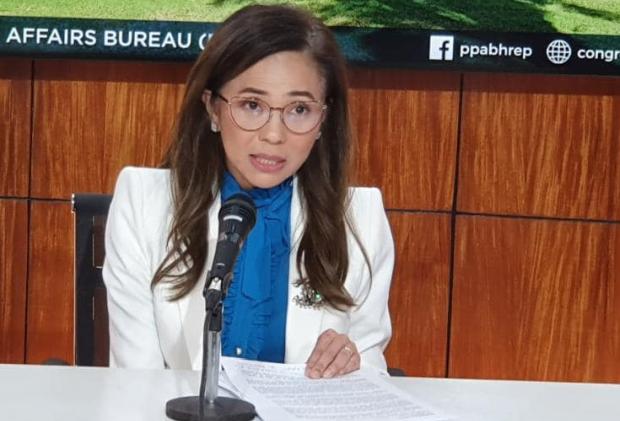‘Overkill’ would have been better response to nCoV, says lawmaker

Quezon Rep. Angelina Tan presides at a press conference on the novel coronavirus, which was held on Monday, Feb. 3, 2020, at the House of Representatives. (Photo from her Facebook account)
MANILA, Philippines — “Overkill,” instead of cautiousness, might well have been the better government response to the threat posed by the novel coronavirus during the early stages of the global outbreak, according to the chair of the House health panel.
“In my personal opinion, the DOH [Department of Health] should have recommended that [ban on travelers from China] to the President at the beginning of the outbreak… especially those direct flights from Wuhan,” Quezon Rep. Angelina Tan, who is a medical doctor, said on Sunday.
“It’s a new virus. Nobody knows how it will behave or the characteristics… So I think it’s better to have an overkill preventive response,” she said in a text message to the Inquirer.
Tan said the uncertain nature of the new disease should have pushed the DOH to take more extreme measures that might have helped authorities better contain its spread.
“It’s OK to have an exaggerated response because it’s the health of the people which means our lives are at stake,” she added.
Article continues after this advertisementBayan Muna Reps. Carlos Zarate and Ferdinand Gaite, on the other hand, minced no words in assailing the Duterte administration’s “apparent lackadaisical approach and wrong priorities” in addressing the health crisis.
Article continues after this advertisementZarate said the government’s slow response “cannot simply be glossed over,” as “the country is now placed at an even greater risk.”
“The preemptive ban on flights coming from affected areas, particularly in China, was made only after the death of the victim,” he said.
The country recorded its second case and the first fatality from the novel coronavirus strain outside China on Feb. 1, a 44-year-old Chinese man who came from the epicenter of the outbreak in Wuhan.
The patient had accompanied the 38-year-old woman who was recorded as the country’s first confirmed case of novel coronavirus, though she was asymptomatic.
Tan said one of the DOH’s shortcomings was in the “cascading of communications like interim guidelines for all health workers in the front lines to follow.”
“I was informed that since the positive case [confirmed], nothing has been passed on to the ground,” she said.
Tan said such interim guidelines were apparently still undergoing a “vetting” process by the DOH’s executive committee.
“Now that we have one mortality, it might change again… in that aspect, I think more can be done to improve because all channels of the health workforce are relying on what will the DOH have to say as their legal reference,” she said.
But Tan reminded the public that it was not only the DOH’s responsibility to manage the outbreak.
“[Everyone] has a role to play, not only the DOH… It should be a concerted effort of everyone at this time. Be vigilant but be calm,” she said.
Zarate said he had also received reports that the male victim who died and his companion had been in the country for quite some time, as part of a group tour.
“They stayed in a hotel in Manila prior to being hospitalized for suspicion of being nCoV infected,” he said.
“We strongly call on authorities therefore to initiate a serious, thorough back-tracing of places and people who may have been in contact with the victim, including their other tour companions, hotel personnel, transport operators and tourist guides,” he said.
“This tracing should be a serious priority so that the possible nCoV spread can be prevented early on,” Zarate said.
Gaite scored the “belated decision” of President Rodrigo Duterte to finally implement a temporary travel ban on all people coming from China.
“As it is, more than 14,000 people have been reported infected worldwide after the first confirmed case of the 2019 novel coronavirus was identified in China less than a month ago and with 304 deaths now attributed to the disease,” he said.
Quezon City Rep. Precious Hipolito Castelo, on the other hand, stressed the importance of building a hospital that would specialize in communicable diseases.
“Our government should build a medical facility with experts and equipment capable of dealing with contagious illnesses such as the one caused by the novel coronavirus,” she said in a separate statement.
Castelo said the Research Institute for Tropical Medicine (RITM) and the San Lazaro Hospital “are wanting in very crucial resources.”
“China constructed several hospitals after the outbreak of the virus. It was done after two weeks,” she noted.
“We currently don’t have a hospital that focuses on highly infectious ailments. One makeshift tent is not sufficient to avoid contamination of a dreaded disease in the magnitude of the novel coronavirus,” Castelo said.
At a press briefing on Monday, Tan said the Department of Health (DOH) was asking Congress to pass a P1-billion supplemental budget to respond to the growing crisis.
She expressed support for the proposal, saying “it is about time” to do so, considering the scale of the problem.
“The DOH proposal is actually almost P1 billion to beef up budget requirements of various DOH offices such as the Disease and prevention Control Bureau, for its logistics and commodities; the Epidemiology Bureau, for its surveillance; the Health Facility Development Bureau, for its health facility preparedness; the Health Emergency Management Bureau, for its quick response; the Bureau of Quarantine; the Health Promotion and Communications Service, and the Research Institute for Tropical Medicine,” Tan said.
She said she was also inclined to file a House resolution to “look into the country’s preparedness for health emergencies.”
“We need to be proactive. If we waited until the first case of nCov has been confirmed before we acted, it could have been too late the hero for us,” Tan said.
/atm